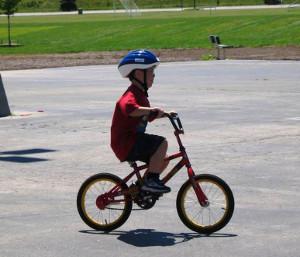 Alex was diagnosed with Williams syndrome when he was six weeks old. We read the pamphlets and went to the Williams Syndrome Association website. We found a lot of information about the types of things that Alex would probably not be able to do. But, we also knew that despite the typical expectations, Alex was his own person. We didn’t know what he might be capable of, and we certainly weren’t going to hold him back.
Alex was diagnosed with Williams syndrome when he was six weeks old. We read the pamphlets and went to the Williams Syndrome Association website. We found a lot of information about the types of things that Alex would probably not be able to do. But, we also knew that despite the typical expectations, Alex was his own person. We didn’t know what he might be capable of, and we certainly weren’t going to hold him back.
Alex learned to walk when he was two years old. With a lot of help and physical therapy, he was riding a tricycle and then a bike with training wheels. Our family likes to go on bike rides, so when Alex finished kindergarten it was time for him to join in the fun. It wasn’t going to be easy, but we decided our summer project would be to teach our seven year old how to ride a bike.
Step one was to get Alex a bike that he could sit on, but have his feet reach the ground so he could easily hold up the bike. Step two was to drive Alex and his bike to a nice big open park where he could have lots of room with nothing to run into. At first, Alex learned that he could just push the bike along with his feet – no problem. Then came the big step – moving forward and pedaling without falling. Dad had to follow along and hold Alex up for a lot of attempts. Then little by little, Dad was holding on less and less. After a while, and with a nice big push start from Dad, Alex was pedaling along all on his own!
Did Alex fall sometimes? Of course. Did Alex get discouraged and want to quit? Of course. But we kept practicing every day, and Alex had lots of motivation to reach that goal. We kept reminding him that he could ride his bike to his friends’ houses – especially the little girl down the street that he liked so much. If he learned how to ride, then he could join his older brother and us for rides around the neighborhood. But best of all, if he would practice for 20 minutes, then we would take him for a frozen coke. Alex LOVES frozen cokes. Plus, nothing makes a pair of scratched up knees feel better than the taste of a frosty frozen coke.
So we kept going to the park and giving him frozen cokes. Anytime he got upset with us, afterwards he would say, “I’m so sorry Mom and Dad. I know you are doing what’s best.” After Alex learned to pedal his bike, we then had to teach him how to stop. First, he would stop by just falling off the bike and then, he would stop by dragging his feet. He literally wore holes in the bottoms of his tennis shoes. We would tell him, “Alex, you’re not Fred Flintstone – use your bike brakes!” It took him awhile to get used to pushing the pedal in reverse to brake, but after some more frozen cokes, he got it.
The last step was learning how to take off on his own. Dad wasn’t going to be there all the time to give Alex his big push to get him started. This took some more practice and some more frozen cokes. At first Alex used the “rolling start” method – he would get himself moving with his feet and then shift to pedaling. But eventually he figured out how to hold himself up on the bike and push off on the pedals to get moving on his own. How many frozen cokes in all did it take that summer? Maybe fifty, maybe more.
Alex is thirteen years old now. We have taken countless bike rides around our community. We are talking about taking a bike tour some year in the future. Alex continues to amaze us with what he can do every day. We don’t worry about the things that Alex can’t do. We just try to make sure that Alex has the chance to do as many activities that he would enjoy as possible. He has played on a soccer team, sung solos on a stage, auditioned and made his junior high school show choir, volunteers with many organizations through church, and many other things. The other day Alex and I were driving somewhere in the car and he looks over and says, “I have a pretty good life.” I asked him why he said that and he said, “I am doing good in school. I’m in the talent show and show choir. I help people. I think it is pretty good.” How can you argue with that?!!!
Michelle Self & Bill Bentley
